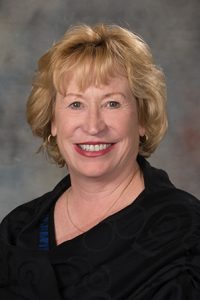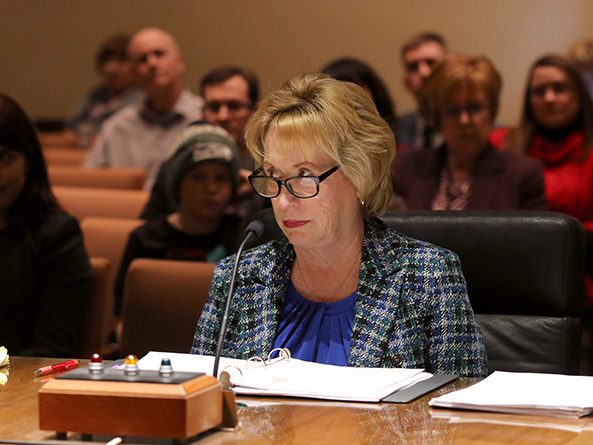Tax credit for private school scholarship donations considered
The Revenue Committee heard testimony March 7 on a bill that would create an income tax credit for those who donate money to nonprofits that grant scholarships to students to attend a private elementary or secondary school.
Under LB670, introduced by Elkhorn Sen. Lou Ann Linehan, individuals, passthrough entities, estates, trusts and corporations could receive a nonrefundable income tax credit in an amount up to 50 percent of their income tax liability for the year. The scholarships could be used to pay tuition and fees at a qualifying non-governmental, privately operated elementary or secondary school in Nebraska.
Students who are Nebraska residents and whose household income does not exceed twice the eligible income for the federal reduced-price lunch program could qualify for the scholarships.
Linehan said LB670 would ensure that all children have access to high-quality education. The proposal would result in fewer students attending public schools, she said, which would save the state money. Linehan cited a report on a similar tax credit scholarship program in Florida, which found that the program saves the state $1.49 for every $1 it foregoes in tax revenue.
“This bill will not hurt children attending public school,” she said. “I am confident it will deliver long-term significant savings to the state and local taxpayers, and, most importantly, it can help lower-income families struggling to find a school that works for their children.”
LB670 would limit the amount of tax credits available for calendar year 2020 to $10 million. After that, the annual limit would increase by 25 percent if the intended tax credit amounts in the prior calendar year exceeded 90 percent of that year’s cap.
Jacob Idra, a Creighton University student, testified in support of the bill. He said his parents worked long hours to ensure he could attend Catholic schools during his grade school and high school years. A private education can be a “one-way ticket” to a better life, Idra said.
“I know this bill will allow for more students with similar stories to mine to have a choice in their education, a choice that could change their lives forever,” he said.
Sarah Schinstock of Lincoln also testified in support, saying the bill would benefit her family. Several of her children attend a Catholic elementary school, she said, which recently announced a tuition increase from $50 to $1,600 per year per student.
Patrick Wolf, a University of Arkansas professor who studies private school choice programs across the country, testified in support of LB670 on his own behalf. He said several studies have found a positive effect on participating students’ test scores and others have found a positive effect on the highest level of education a participating student attains.
Adam Weinberg, communications and outreach director at the Platte Institute, also testified in support, saying the proposed tax credit would help students who otherwise would be supported by state and local property taxpayers. That would be a clearer benefit than other tax expenditures the Legislature has approved, he said.
“Providing tax-free admission to the zoo, giving a tax break to renovate a hotel or paying turnback taxes to the Ralston arena do not have as clear of an impact … on the well-being of Nebraskans as providing educational options for children who do not have them right now,” Weinberg said.
Maddie Fennell testified in opposition to the bill on behalf of the Nebraska State Education Association. She said Nebraska ranks 48th in the nation in state support for K-12 public education and that the Legislature has met its full obligation under the state’s school aid formula in only three of the past 14 years. That has contributed to the state’s overreliance on property taxes to fund public schools, Fennell said.
“We need to be investing in public schools,” she said, “not diverting public dollars into private schools.”
Ann Hunter-Pirtle, executive director of Stand for Schools, also testified in opposition, saying the scholarships mainly would benefit students who already can afford to attend private schools. Under the bill, she said, a family of four earning approximately $90,000 per year would qualify.
Hunter-Pirtle said the bill would prohibit private schools from discriminating against students based on their race but not religion, national origin, special education needs, sexual orientation, disability or other factors.
Don Mayhew, a Lincoln Public Schools board member, testified in opposition to LB670 on behalf of the Greater Nebraska Schools Association. He said the proposal would cost the state money at a time when budget shortfalls have constrained K-12 funding.
The program would direct state funding to private schools, which are not subject to the same testing and budget transparency requirements as public schools, Mayhew said.
Renee Fry, executive director at OpenSky Policy Institute, also testified in opposition. She said the authors of the report Linehan cited have acknowledged that such a program would only save money if more than 50 percent of transfer students switched from public to private schools because of scholarships.
“This is important because if the scholarships are going to kids that would have gone to private schools anyway, it just costs the state money,” Fry said. “The credit can only result in savings if a significant number of public school kids transfer to private schools in a way that would reduce public school expenses.”
The committee took no immediate action on the bill.


